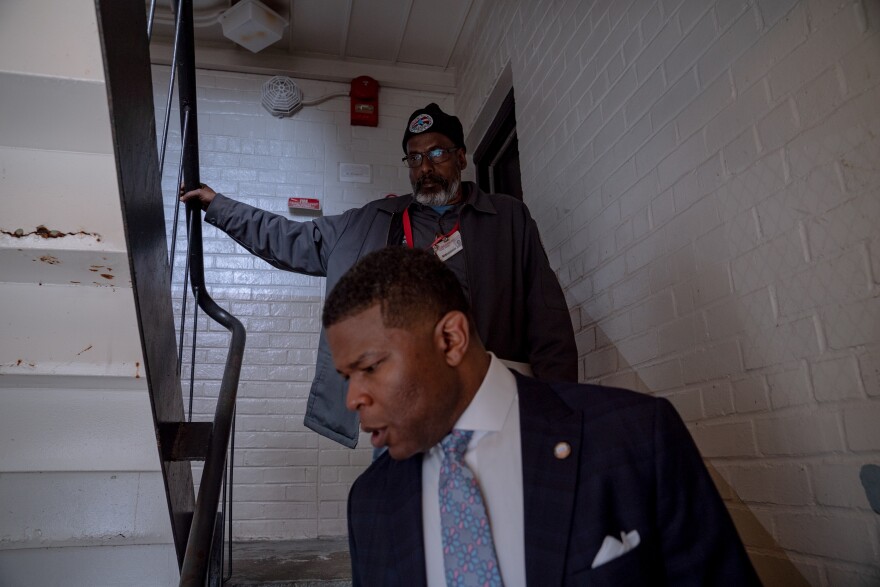Benjamin Schachtman: So Kelly, you went to the Wilmington Housing Authority’s monthly meeting this week, which was the first one with the new CEO at the table.
Kelly Kenoyer: That’s right. Tyrone Garrett has entered the building. And he’s feeling good about his new role, despite all of WHA’s challenges.
Garrett: “I'm enjoying it. It's nothing that I haven't seen before. I'm enjoying the challenge, it’s a lot of fun. It keeps me going. And I'm excited about the opportunities that we have here. But again, the first first priority the Board gave to me, right when I came on board, was to deal with our residents who have been relocated from their homes due to mold. And so first priority is to make sure that they can get back and then we'll start working on everything else.”
BS: Well I’m glad he’s feeling confident, because from our reporting it was clear WHA needed some strong leadership. What was the meeting like?
KK: Well, a swath of new board members have also come in, appointed by Mayor Bill Saffo. Notably, realtor Jeff Hovis took the helm as chair. And the energy in the room was much different from meetings we’ve seen in the past. There was a lot more back and forth between board members and staff, with questions and ideas circulating. It was also clear that they’re in consistent communication by email between meetings.
BS: Communication is good, but has that led to any solutions?
KK: Well, I found out that there are 600 Housing Choice Vouchers available in the region — those are like Section 8, the same thing — and that 97 of the 150 families currently displaced by mold are qualified for those vouchers.
BS: That’s big. So Garrett is trying to help those families get the vouchers?
KK: Yes he is. They notified 23 of the families to come pick them up, but only 12 came to pick them up. He said that’s probably because they were notified largely by mail, and that a lot of those residents get their mail at their homes, not at the hotels they actually live in.
BS: Yikes, that’s bound to be frustrating — especially since we’ve heard WHA has contacted some residents by phone about other things, like per-diem checks being ready. What are they doing to improve the line of communication?
KK: Well, Garrett said he’s hoping those families will spread the news by word of mouth. He’s also planning to have a mandatory meeting for displaced residents where some of this information can be explained. And they’ll have another day when residents can show up to get vouchers before they start opening them up to others in the community.
BS: That makes sense. But let’s get into the money issue- housing these residents in hotels is costing a lot of money -- like a million a month, by some estimates. And [the U.S. Department of] Housing and Urban Development recently told WHA that they can’t use the capital fund balance to pay for these hotel costs, so they only have about a month of usable cash left. What’s Garrett doing about that?
KK: Well as you said, they’re going to run out of that capital cash on July 1. But the city and the county are coming through with budget allocations — each is putting in $1.5 million to help WHA with gap financing. It’s about half of what Garrett thought he would get, and a fifth of the sum total WHA thinks they need for the year.
BS: What about the rest?
KK: So the gap financing from our local governments will cover the summer, and WHA is applying for an emergency HUD grant after that. It would be $15 million, and would hopefully cover the rest of the need. They’re applying for other grants too, and they’re also asking residents in the hotels to apply for the county’s emergency rental assistance program.
BS: I remember that — it was some covid-era money aimed at helping renters cover their costs if they lost work and needed help.
KK: Yep, and there’s a lot left, so Garrett wants to see it get used to cover the hotel costs. It’ll help that $3 million stretch a bit further.
As for the grant, some of it would cover the hotels, but a lot of it would go to dealing with the mold crisis itself. Garrett is trying to get the mold-infested apartments repaired as quickly as possible, and wants to have more than 100 fixed before the end of the year. He’s going for 20 a month!
BS: How did he manage to plan for that?
KK: Well, he’s limiting what they’ll do in each apartment to try to get them online faster.
Garrett: “The idea is to get residents back to their units as soon as possible. I've put forth an aggressive idea and concept, changing the scope of work, but also ensuring that their health and safety is the priority for whatever work that we do.”
KK: So basically, their contractors will deal with the immediate health issue of the mold, and not the entire backlog of maintenance that these very old homes might benefit from. He said that they're going to use $25,000 for each unit. And he suggested that that's necessary, because in the past, maybe people have taken that money that was available when it was an open checkbook a little further than they should have.
BS: As long as they’re not just papering over mold problems, which we’ve heard has happened in the past — then that makes some sense, particularly for a place like Hillcrest, which will be redeveloped in the next 10 years.
KK: Speaking of which, They’ve made some progress on that, too. Earlier this spring, WHA officially selected a developer for that project: Related Urban. But we’re still really early along on that process, and Garrett said there’s not a detailed plan for the site quite yet. But, he promised to keep residents in the loop as the process goes on.
BS: Gotcha. I know a lot of residents are worried about being displaced, so it’s good to hear he plans to be open about it. Anything else we should know from the meeting?
KK: Well, Garrett has started delegating clear roles to existing staff, and he’s already hiring more leadership. You’ll recall the executives at WHA were kind of cleared out by the previous director, Katrina Redmon, who then left the authority with a power vacuum when she resigned.
BS: Yeah, that did not help with the mold crisis. Who did he hire?
KK: There’s a new CFO, Kinteh Darboh. He came from DC, so Garrett hired him away from his old housing authority. That means they have an existing working relationship. He just started on Monday. And next month, a new Chief Development Officer/Chief Operating Officer will take the helm, coming from Wyoming.


